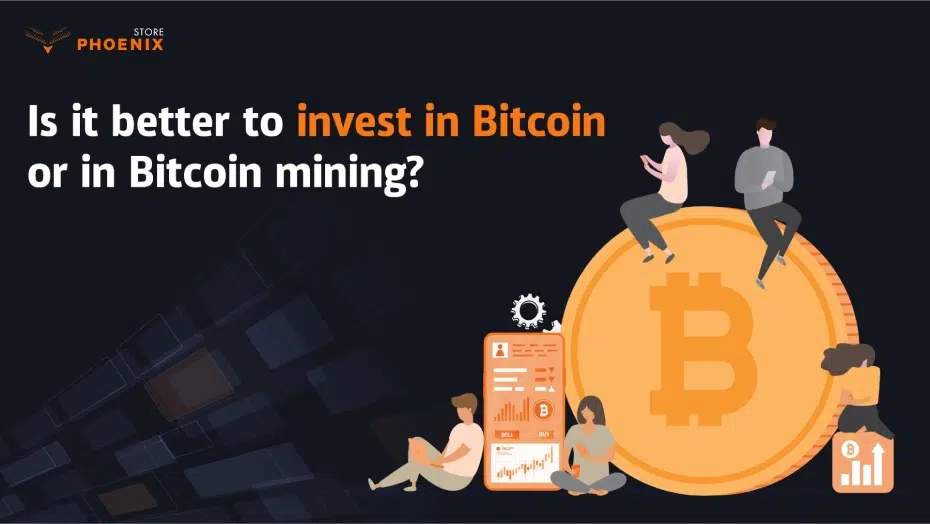Bitcoin vs. Bitcoin mining: Which is more profitable?

With Bitcoin continuing to make waves in the financial world, many are left wondering: is it better to invest in Bitcoin or Bitcoin mining? Both options promise significant returns, but they come with very different strategies and risks. In this blog, we’ll break down the key factors you need to consider before making your decision, from potential profits to technical requirements, helping you choose the best investment path for your goals.
Understanding Bitcoin: What You Need to Know
Bitcoin is a decentralized digital currency that operates without a central authority, such as a government or financial institution. It uses blockchain technology to enable secure and transparent transactions. Bitcoin is created through a process called mining, where powerful computers solve complex algorithms to validate transactions. Once validated, transactions are added to the blockchain, ensuring that they cannot be altered or reversed.
Bitcoin has experienced remarkable growth since its creation in 2009. Initially valued at less than a cent, Bitcoin’s price surged to unprecedented highs, reaching over $60,000 in 2021. However, its price has also been volatile, with significant drops and fluctuations. Despite these ups and downs, Bitcoin has consistently outperformed many traditional investment options, making it an attractive asset for long-term investors. Its historical performance demonstrates both its potential for substantial returns and the risks involved due to its volatility.
An Overview of Bitcoin Mining
Bitcoin mining is the process by which new bitcoins are created and transactions are validated on the Bitcoin network. It involves solving complex mathematical puzzles through a process called “proof of work.” Miners use powerful computers to compete to solve these puzzles, and the first one to succeed is rewarded with newly minted bitcoins. This process not only generates new bitcoins but also ensures the security and integrity of the Bitcoin network by verifying transactions.
The technology behind Bitcoin mining is based on blockchain, a decentralized ledger that records every transaction ever made. Miners use specialized hardware, known as ASICs (Application-Specific Integrated Circuits), to solve cryptographic puzzles faster and more efficiently. These mining rigs require substantial computing power and electricity, making Bitcoin mining a resource-intensive activity. As the network grows, the difficulty of these puzzles increases, requiring even more advanced technology to remain competitive.
The Pros and Cons of Investing in Bitcoin
Investing in Bitcoin can offer substantial rewards, but like any investment, it comes with its own set of risks. Here’s a look at both the advantages and disadvantages of putting your money into Bitcoin.
Pros:
- High Potential Returns: Bitcoin has shown significant growth over time, with investors earning substantial profits, particularly during bull markets.
- Decentralization: Bitcoin operates outside the control of any central authority, offering greater freedom from government regulations and traditional financial systems.
- Liquidity: Bitcoin is widely traded on various platforms, making it easy to buy, sell, and trade.
- Hedge Against Inflation: Some investors view Bitcoin as a store of value, similar to gold, especially in times of economic uncertainty or inflation.
- Global Reach: Bitcoin is accessible globally, allowing users to transact across borders without relying on traditional banking systems.
Cons:
- Price Volatility: Bitcoin’s value can fluctuate wildly in short periods, making it a risky investment.
- Regulatory Uncertainty: Governments around the world are still figuring out how to regulate Bitcoin, creating potential legal risks for investors.
- Security Concerns: Although Bitcoin itself is secure, exchanges and wallets can be vulnerable to hacking, which can result in the loss of funds.
- Energy Consumption: Bitcoin mining consumes a significant amount of energy, raising environmental concerns.
- Limited Acceptance: While growing, Bitcoin’s acceptance as a method of payment is still limited compared to traditional currencies.
The Pros and Cons of Investing in Bitcoin Mining
Bitcoin mining is a different form of investment that involves hardware, energy, and ongoing operations. Here’s a breakdown of its main pros and cons.
Pros:
- Steady Passive Income: Miners earn rewards in Bitcoin, which can generate consistent income over time.
- Control Over Infrastructure: Unlike buying Bitcoin, mining gives investors direct control over their operation and output.
- Network Contribution: Mining supports the Bitcoin network, making it a more active way to participate in the ecosystem.
- Potential for Long-Term Profitability: With the right setup and market conditions, mining can yield strong returns even during moderate price cycles.
- Tax and Depreciation Benefits: In some jurisdictions, mining equipment and energy costs may be eligible for tax deductions.
Cons:
- High Initial Investment: Setting up a mining operation requires significant capital for hardware and infrastructure.
- Energy and Maintenance Costs: Ongoing electricity use and system upkeep reduce profit margins.
- Hardware Obsolescence: Mining equipment can become outdated quickly, requiring constant upgrades to remain competitive.
- Market Dependency: Profitability depends on Bitcoin’s price and network difficulty, which can change rapidly.
- Geographic Limitations: Access to cheap electricity and favorable conditions often varies by region, making mining less viable in some areas.
Comparing Long-Term Investments: Bitcoin vs. Mining
When looking at long-term strategies, both buying Bitcoin and investing in mining have distinct advantages. Buying and holding Bitcoin is simple and passive. It requires no technical setup and offers high potential returns, especially when bought during market dips. However, it’s fully exposed to market volatility and depends on timing.
Bitcoin mining involves higher upfront costs and ongoing operations but can generate steady income through block rewards. With efficient equipment and low energy costs, mining can be profitable over time. Still, it’s more complex and sensitive to shifts in energy prices and network difficulty.
Ultimately, Bitcoin investing may offer greater flexibility and liquidity, while mining can provide a more consistent revenue stream – with added complexity and risk.
Initial Costs and Ongoing Expenses
When investing in Bitcoin or Bitcoin mining, there are key costs to consider.
Buying Bitcoin requires only the cost of purchasing the asset, which can be done through exchanges. The primary ongoing expense is transaction fees for buying, selling, or transferring Bitcoin. These fees can vary depending on the platform used and the size of the transaction. Additionally, you may incur fees for storing Bitcoin securely, such as the cost of a hardware wallet.
Setting up Bitcoin mining, however, involves more significant initial costs. Miners need to invest in specialized hardware, such as ASIC machines, which can cost thousands of dollars. There are also ongoing expenses, primarily electricity to run the mining rigs, which can be substantial depending on the scale of operations. Maintenance and repair costs for equipment, as well as any necessary upgrades, also contribute to the overall expenses.
Additionally, in some cases, hosting fees may apply if mining rigs are placed in specialized data centers. For those who prefer a more streamlined setup, crypto mining hosting services can take care of the heavy lifting and technical requirements, making mining more accessible than ever.
Market Trends Comparison
Bitcoin has seen significant price fluctuations in recent years but remains a leading asset in the digital currency space. As of 2025, it continues to be a popular investment choice, driven by growing institutional interest, increasing adoption as a store of value, and more regulatory clarity. However, Bitcoin is still highly sensitive to market sentiment, economic factors, and global events, which contribute to its volatility.
The future of Bitcoin mining looks promising but comes with challenges. As more miners join the network, the difficulty of mining increases, requiring more powerful and energy-efficient hardware. While the potential for profitability remains, mining’s success will depend heavily on electricity costs, technological advancements, and Bitcoin’s market price. With increasing competition, those who can operate with low overhead and high efficiency will be in the best position to succeed.
If you’re considering Bitcoin mining and want to assess profitability, check out the Bitcoin mining profitable calculator to get accurate projections tailored to your setup.
Making the Decision: Which Investment is Right for You?
When deciding between Bitcoin investment and mining, several factors should be considered.
- Initial Capital: Bitcoin investment requires less upfront cost compared to mining, which demands significant capital for equipment and infrastructure.
- Risk Tolerance: Bitcoin investment is passive but volatile, while mining involves ongoing operational risks and maintenance.
- Technical Expertise: Mining requires technical knowledge and the ability to manage hardware, while investing in Bitcoin is simpler and more hands-off.
- Time Commitment: Mining requires continuous monitoring and adjustments, whereas Bitcoin investment is more flexible and requires less time.
- Long-Term Goals: Consider whether you’re looking for potential long-term growth (Bitcoin investment) or steady passive income (Bitcoin mining).
Conclusion
Both Bitcoin investment and mining offer unique opportunities, each with its own set of advantages and challenges. Bitcoin investment provides simplicity and liquidity, with potential for high returns but also high volatility. On the other hand, Bitcoin mining offers the possibility of steady passive income but comes with high upfront costs, technical complexity, and ongoing expenses.
Ultimately, the right choice depends on your risk appetite, financial resources, and long-term goals. If you’re considering mining as a more hands-on approach, exploring locations with favorable conditions like Bitcoin mining in UAE could provide additional advantages.
 How Much of the World’s Money is in Bitcoin?
How Much of the World’s Money is in Bitcoin?
 »
»